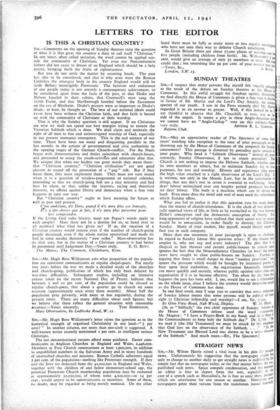SIR,—May an appreciative reader of The Spectator of some forty
years' standing take exception to the tone of your paragraph on the throwing out by the House of Commons of the proposals for Sunday amusement? This passage is distorted by prejudice quite unusual in your pages. Why head it "Sabbath Observance" instead of, more correctly, Sunday Observance, if not to create prejudice? The Church is not seeking to impose the 'Hebrew Sabbath, whether upon its own members or others, but to maintain Sunday for its true purposes, for rest and worship. History and experience alike prove the high value attached to a right observance of the Lord's Day. It is written, not only in the Mosaic Law, but in the constitution of things, that one day's rest in seven is essential to well-being. Seven days' labour maintained over any lengthy period produces less than six days' labour. The body is a machine which can be driven too hard. Even more does the mind and soul of man need the refreshment which Sunday offers.
What you fail to realise is that this question cuts far more deeply than the matter of church-attendance. It is the clash of two diametri- cally opposed views of life, as little to be reconciled as the war between Hitler's conception and the democratic conception of liberty. Fa long opponents of religion have realised that their surest way to success would be to emasculate, in order finally to destroy, the Christ:an Sunday. Many of your readers, like myself, would deeply regret to find you in such company.
More than one statement in your paragraph is open to challenge. In regard to Sunday labour this question arises: If the theatre may employ it, why not any and every industry? The plea that it is illogical to ban theatres and permit public-houses to remain open ignores the fact that the Nonconformist Churches (at least) for many years have sought to close public-houses on Sunday. Further, in arguing that there is small danger in these "modest provisions" you ignore the pressure which would be brought by interested ponies to bear upon local authorities. An organisation financially interested can move quickly and secretly, whereas public opinion takes time and organisation if it is to become effective. Too often by the time this happens the pass has been sold. I, too, would like to see a referendum on the whole issue, since I believe the country would determine much as the House of Commons has done.
In one final word, may I urge you to consider that every extension of Sunday labour means that some persons will be robbed of tbe right to Christian fellowship and worship?—I am, Sir, yours, 8o Glen View Road, Nab Wood, Shipley. W. H. HEAP. [As to "Sabbath," the two chief opponents of Sunday :Ilexes ie the House of Commons debate used the word extensively. Mr. Magnay: "I have a Prayer-Book in my hand, and in it the-Ri! the Commandment to keep holy the Sabbath day." Dr. Little: 'f As we read it [the Old Testament] we must be struck by the MO,: that God lays on the observance of the Sabbath. . . ." "In New Testament our Blessed Lord was shown to be a stria observe' of the Sabbath." And much more.—ED., The Spectator.]






























 Previous page
Previous page